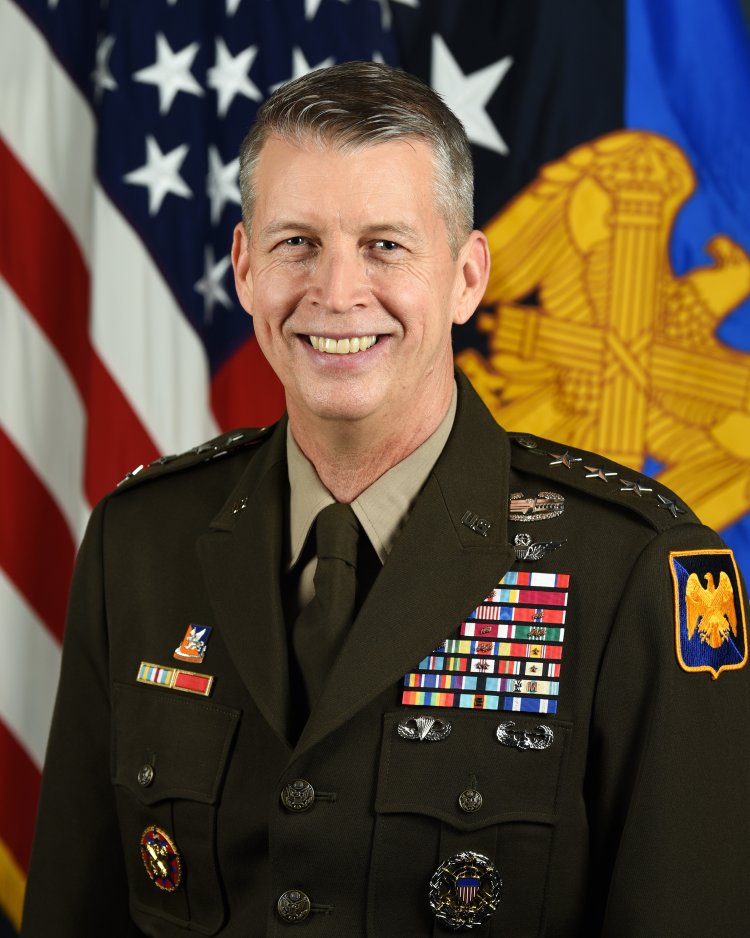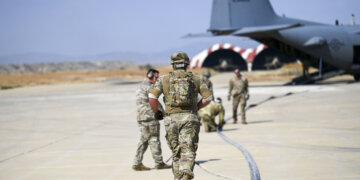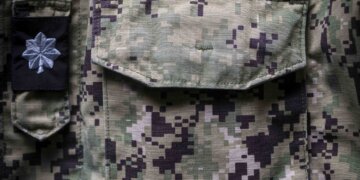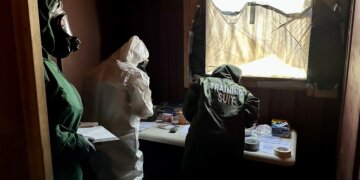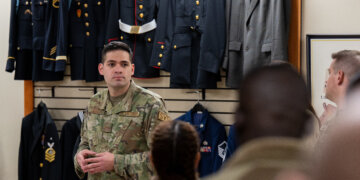ROME (2/7/22) – The National Guard Bureau’s chief, Army Gen. Daniel Hokanson, a member of the Joint Chiefs of Staff, joined the 2022 African Chiefs of Defense Conference in Rome last week for a series of senior-level engagements seeking to most effectively partner with regional militaries.
Hokanson, adjutants general from 11 states and territories, and the District of Columbia National Guard’s commanding general joined Joint Force colleagues at the conference to talk with African partners about the challenges facing the continent and its countries.
Hosted by U.S. Africa Command, the conference brought together 36 senior defense leaders from across Africa and senior American military leaders for three days of discussions and bilateral side meetings focused on solutions to challenges facing the continent and its countries.
Officials took part in panel discussions examining the intersecting implications of threats to security, including climate change, rule of law, technology, interoperability and other collective security challenges.
A common theme shared by African and American military leaders is that they face the same security threats and challenges – and must address these challenges together as partners and allies.
Keynote speaker Fauziya Abdi Ali, president of Women in International Security Horn of Africa, highlighted the importance of including women in peace and security initiatives on the African continent.
Addressing the State Partnership Program
Hokanson hosted bilateral meetings between National Guard adjutants general and their partner nations under the Department of Defense National Guard State Partnership Program (SPP).
“The National Guard brings tremendous experience to discussions here about readiness and interoperability, and the role of the military in disaster preparation, crisis response and recovery efforts,” Hokanson said.
The SPP – and its role supporting USAFRICOM – was highlighted in one of the conference briefings. The DOD security cooperation program is conducted by the National Guard Bureau, employed by the geographic combatant commands and executed by each state.
“The State Partnership Program provides consistent training and engagement between National Guard units and 16 of our African partner nations,” said Army Gen. Stephen Townsend, USAFRICOM commander. “The program’s biggest benefit is the troop-to-troop ties that it builds, which is where the National Guard is especially valuable.
“While active-duty members switch out a lot, our National Guard counterparts can offer consistent training and engagement over the course of years, which builds trust and understanding,“ Townsend said. “The work done in these partnerships is vital to strengthening alliances, providing mutually beneficial training and enhancing security in Africa.”
One African defense chief said the SPP helped his armed forces become his nation’s most-trusted institution. Another emphasized how an SPP relationship that started with military-to-military exchanges was the catalyst to a high-level cultural, social and economic relationship.
The SPP fosters large and small engagements between National Guard units and almost half of the world’s countries. The program started in 1993 as a means for the Defense Department to help the militaries of former Soviet Bloc nations in Central and Eastern Europe transition to democratic rule after the 1991 collapse of the Soviet Union.
Evolution of the SPP
The SPP has grown to 85 partnerships with 93 nations. It will soon expand to two more, with the Defense Department’s recent announcement that Oman and the Republic of Cypress will join the program.
The first partnerships on the African continent began in 2003 when the New York National Guard paired with South Africa. There are 17 partnerships in Africa, 16 of them with nations in the USAFRICOM area of responsibility, and one with Egypt, in the U.S. Central Command’s AOR.
Typically, there are about 150 SPP events in USAFRICOM each year. In spite of the COVID-19 pandemic, the SPP held 91 events in USAFRICOM in 2020, including exchanges on helicopter and aircraft maintenance, hazardous response and the use of the M224 60 mm mortar. Despite the pandemic, exchanges increased again in 2021.
“Like everyone, we adapted to the pandemic challenge,” Hokanson said. “Indeed, we were able to share lessons learned, benefitting the U.S. and our SPP partners.”
Assistance from USAFRICOM and other U.S. agencies helped 49 African countries fight the virus and represented more than a $400 million investment. The United States spent $10.58 billion on foreign assistance to Africa in 2020, the most recent year for which a number is available.
‘A level of interagency understanding’
Army Maj. Gen. Gregory Knight, adjutant general of the Vermont National Guard, told attendees about his state’s experience with three SPP partnerships, the most mature of which stretches back 28 years. Vermont is paired with North Macedonia, Senegal and Austria.
Partners build long-term relationships at every level, from junior enlisted troops to senior leaders, Knight said. When a nation partners with the National Guard in a state, it gains access to the 443,000-strong National Guard in every state and territory, Knight said. If Vermont can’t fill a partner nation’s request, it will find a state that can.
Guard members offer U.S. allies and partners civilian-acquired skills, in addition to their military training, Knight said. And partnerships that begin with military-to-military relationships often deepen and broaden to purely civilian engagements in agriculture, education and commerce.
“These are mutually beneficial relationships,” Hokanson said. “The SPP is an innovative, cost-effective, flexible program that uses small footprints and supports both U.S. and partner nation security objectives. It builds defense capability and capacity, and the SPP fosters enduring personal and institutional relationships. It’s a win for everyone involved.”
“The SPP matches military organizations of comparable size, focus and mission,” said Air Force Col. Mathew Wenthe, chief of international affairs for the National Guard Bureau. “It provides full-spectrum military capabilities, plus others not found in the active component, and it enhances the operational skills and regional expertise of our Soldiers and Airmen.”
SPP activities run the gamut from familiarization visits to full co-deployments in combat zones and engagements at the elite Special Forces level.
“Because of their domestic response duties, our Guardsmen bring a level of interagency understanding and disaster response skills not commonly found in the active-duty force,” Hokanson said. “Add to that Guardsmen’s civilian-acquired skills in education, law enforcement, medical and numerous other professions, and we are able to be a significant contributor to meeting the combatant command’s objectives.”
Identifying mutual support
Last year, in Morocco, Hokanson observed SPP participation in African Lion ’21, one of six annual major exercises hosted by USAFRICOM. “The National Guard’s primary mission is providing manned, trained, equipped and ready combat forces to the Army and Air Force,” Hokanson said. “The SPP helps us achieve our readiness and interoperability priorities in order to meet our combat mission.”
Hokanson has emphasized the importance of major exercises to improve readiness, and the SPP offers one avenue to enable that priority. In turn, the SPP helps USAFRICOM access forces, host exercises and increase engagements across the vast continent. “The National Guard is all in to support USAFRICOM,” Hokanson said. “It’s a mutually reinforcing relationship.”
Partners typically identify mutually supportive focus areas for training exchanges. These include disaster response, noncommissioned officer development, aviation operations, cyber defense, infantry tactics, medical skills, counterterrorism and numerous other specialties.
“Face-to-face engagements like the African Chiefs of Defense Conference are absolutely invaluable to learn our partners and allies’ priorities and to advance our mutual strategic interests,” Hokanson said.
Based in Stuttgart, Germany, USAFRICOM is one of seven joint service geographic combatant commands. The command is responsible for all U.S. military operations and activities to protect and advance U.S. national interests in Africa.



